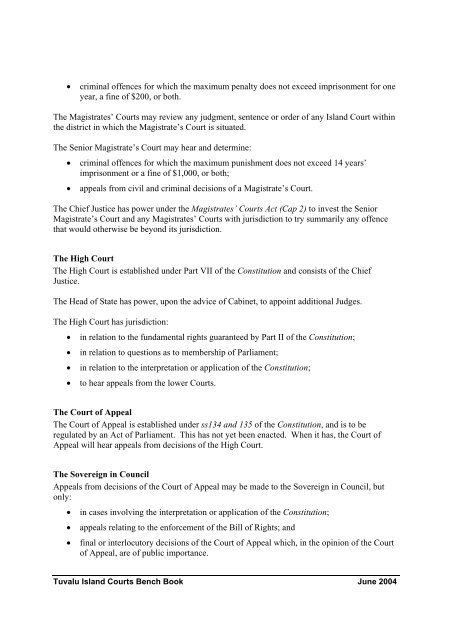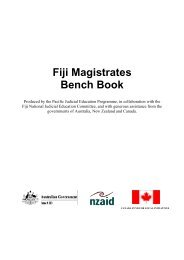Tuvalu Island Courts Bench Book - Federal Court of Australia
Tuvalu Island Courts Bench Book - Federal Court of Australia
Tuvalu Island Courts Bench Book - Federal Court of Australia
You also want an ePaper? Increase the reach of your titles
YUMPU automatically turns print PDFs into web optimized ePapers that Google loves.
• criminal <strong>of</strong>fences for which the maximum penalty does not exceed imprisonment for one<br />
year, a fine <strong>of</strong> $200, or both.<br />
The Magistrates’ <strong><strong>Court</strong>s</strong> may review any judgment, sentence or order <strong>of</strong> any <strong>Island</strong> <strong>Court</strong> within<br />
the district in which the Magistrate’s <strong>Court</strong> is situated.<br />
The Senior Magistrate’s <strong>Court</strong> may hear and determine:<br />
• criminal <strong>of</strong>fences for which the maximum punishment does not exceed 14 years’<br />
imprisonment or a fine <strong>of</strong> $1,000, or both;<br />
• appeals from civil and criminal decisions <strong>of</strong> a Magistrate’s <strong>Court</strong>.<br />
The Chief Justice has power under the Magistrates’ <strong><strong>Court</strong>s</strong> Act (Cap 2) to invest the Senior<br />
Magistrate’s <strong>Court</strong> and any Magistrates’ <strong><strong>Court</strong>s</strong> with jurisdiction to try summarily any <strong>of</strong>fence<br />
that would otherwise be beyond its jurisdiction.<br />
The High <strong>Court</strong><br />
The High <strong>Court</strong> is established under Part VII <strong>of</strong> the Constitution and consists <strong>of</strong> the Chief<br />
Justice.<br />
The Head <strong>of</strong> State has power, upon the advice <strong>of</strong> Cabinet, to appoint additional Judges.<br />
The High <strong>Court</strong> has jurisdiction:<br />
• in relation to the fundamental rights guaranteed by Part II <strong>of</strong> the Constitution;<br />
• in relation to questions as to membership <strong>of</strong> Parliament;<br />
• in relation to the interpretation or application <strong>of</strong> the Constitution;<br />
• to hear appeals from the lower <strong><strong>Court</strong>s</strong>.<br />
The <strong>Court</strong> <strong>of</strong> Appeal<br />
The <strong>Court</strong> <strong>of</strong> Appeal is established under ss134 and 135 <strong>of</strong> the Constitution, and is to be<br />
regulated by an Act <strong>of</strong> Parliament. This has not yet been enacted. When it has, the <strong>Court</strong> <strong>of</strong><br />
Appeal will hear appeals from decisions <strong>of</strong> the High <strong>Court</strong>.<br />
The Sovereign in Council<br />
Appeals from decisions <strong>of</strong> the <strong>Court</strong> <strong>of</strong> Appeal may be made to the Sovereign in Council, but<br />
only:<br />
• in cases involving the interpretation or application <strong>of</strong> the Constitution;<br />
• appeals relating to the enforcement <strong>of</strong> the Bill <strong>of</strong> Rights; and<br />
• final or interlocutory decisions <strong>of</strong> the <strong>Court</strong> <strong>of</strong> Appeal which, in the opinion <strong>of</strong> the <strong>Court</strong><br />
<strong>of</strong> Appeal, are <strong>of</strong> public importance.<br />
<strong>Tuvalu</strong> <strong>Island</strong> <strong><strong>Court</strong>s</strong> <strong>Bench</strong> <strong>Book</strong> June 2004
















